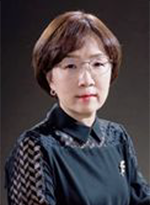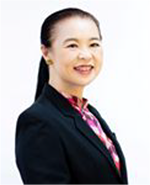
Luncheon Session September 9th 12:10-13:30
Talk: "Women in Engineering in Korea: A Comparative Analysis of Data over the Past Decade" (Online)
Prof. Hye Kyung Cho
Dept. of Applied Artificial Intelligence, Hansung University, Seoul, Korea.

AbstractIn Korea, which ranks at the bottom among OECD countries in the 'Global Gender Gap Index', policies for improving gender imbalance are still in progress. This talk explores the current status and related data on the training and utilization of female STEM talents in Korea. To capture the change at a glance, the numbers of female graduates in STEM fields over the past 30 years will be presented first. Then, a brief review of the government policies implemented to improve gender imbalance in general and programs to support female scientists and engineers will be presented. Finally, the results will be shared which focus on how key data on male and female STEM talents have changed over the past decade.
BioHye-Kyung Cho holds BSC, Masters, and Ph.D. degrees in Control and Instrumentation Engineering from Seoul National University in Seoul, Korea. She has worked within the IT-Convergence Engineering Division at Hansung University in Seoul, Korea since 1996, where she is currently a professor. In 2003, she took a sabbatical to work as a visiting researcher at the Robotics Institute, Carnegie Mellon University, Pittsburgh, USA. Her main research focus pertains to robots in education and human-robot social interaction. She had served as the Vice-President of the ICROS (Institute of Control, Robotics and Systems) until 2021, and was elected as a member of the National Academy of Engineering of Korea in 2019. Currently in 2022, she is serving as the President of the KROS (Korea Robotics Society).
Talk: "Women in Engineering in Thailand"
Prof. Waree Kongprawechnon
Sirindhorn International Institute of Technology
Thammasat University

AbstractIn the previous years, during the engineering profession and education was developed, very few numbers of women are included in the engineering field. In Thailand today, it is seen as good for a woman to become an engineer. This positive attitude has developed over the last three decades. The proportion of women students in engineering has grown from about 10 % in the 1990s to about 30% in the 2020s. The proportion of women in engineering shows that female students have been able to find employment after achieving their degrees. Increases in the percentage of women engineers are resulting from the effects of changes in the key position in both government and private sectors, the convergence of the images of women and engineers, and generally good conditions for women and their involvement in public life. However, the proportion of women is high in some programs (Computer Engineering, Electrical Engineering, etc.) and is still very low in some programs. (Civil Engineering, Petroleum Engineering, etc.) This talk will present IEEE CSS Thailand and Women in Engineering Societies in Thailand and their activities. These activities aim to promote women engineers and their careers. Furthermore, we will introduce some outstanding achievements of Thai women in engineering and their success story. They are role models for young girls and inspire them to follow their academic interests to pursue careers in engineering and science.
Bio
EDUCATION:
GRADUATE SCHOOL OF THE UNIVERSITY OF TOKYO, Tokyo, Japan March 1998
Division of Engineering
Ph. D. of Engineering
Majoring in Mathematical Engineering and Information Physics
GRADUATE SCHOOL OF OSAKA UNIVERSITY, Osaka, Japan March 1995
Division for Research of Engineering Science
Master of Engineering (Control Engineering)
CHULALONGKORN UNIVERSITY, Bangkok, Thailand May 1992
Bachelor of Engineering (Electrical Engineering – First Class Honors)
EXPERIENCES:
Sep’99 – Present
School of Information, Computer, and Communication Technology
Sirindhorn International Institute of Technology,
Thammasat University, Thailand
Associate Professor
Oct’11 – Present
Japan Advanced Institute of Science and Technology
Visiting Associate Professor.
Apr ’22 – Present
Department of Electronics and Information Systems Engineering, Faculty of Engineering.
Osaka Institute of Technology, Japan
Visiting Professor.
AREAS OF INTEREST:
The theory in H∞ control, Control theory, Robust control, System identification, Adaptive control,
Learning control, Neural network and Fuzzy control.

